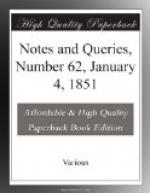“The love of Margaret Roper continued to display itself in those outwardly unavailing tokens of tenderness to his (her father, Sir Thomas More’s) remains, by which affection seeks to perpetuate itself; ineffectually, indeed, for the object, but very effectually for {11} softening the heart and exalting the soul. She procured his head be taken down from London Bridge, where more odious passions had struggled in pursuit of a species of infernal immortality by placing it. She kept it during her life as a sacred relic, and was buried with that object of fondness in her arms, nine years after she was separated from her father.”
X.Z.
Was Quarles pensioned? (Vol. i., p. 201.).—I believe that no reply has been made to this Query. The following passage, transcribed from the Epistle Dedicatory to the surreptitious edition of Quarles’s Judgment and Mercy, affords a slight negative proof to the contrary;—
“And being so usefull,
dare not doubt your patronage of this child,
which survives a father,
whose utmost abilities were (till death
darkned that great light in
his soule) sacrificed to your service.”
Now if Charles had conferred a pension on Quarles, is it not exceedingly probable that the publisher and dedicator, Richard Royston, would have recalled so honourable a circumstance to the memory of his “Most gratious soveraigne King Charles” in this Epistle Dedicatory, when he had so excellent an opportunity of doing so?
J.M.B.
Old Hewson the Cobbler (Vol. ii., p. 442.).—I remember that there was a low song sung at some wine parties in Oxford about fifteen years ago, which began with the words, “My name is old Hewson,” &c. I do not remember the words, but they were gross: the chief fun seemed to consist in the chorus,—a sort of burring noise being made with the lips, while the doubled fists were rubbed and thumped upon the thigh, as if the cobbler’s lapstone had been there.
Was Hewson, the Parliamentarian colonel, a cobbler?
C.P.
The Inquisition (Vol. ii., p. 358.).—The following reply to IOTA’S Queries is extracted from Walchii Bibliotheca Theologica, tom. iii. p. 739.:
“Auctor libri:
Histoire de l’Inquisition et son origine.
Coloniae
MDCXCIII. 12. qui Jacob Marsollierius
est."[1]
Of the history of the Bohemians I can ascertain only that J. Amos Comenius was the author of the original. (See Walch, tom. iii. p. 265.)
[Footnote 1: Journal des Savans, MDCXCIV, p. 331.; Niceronii Memoir., tom. vii. p. 64.]
T.J.




